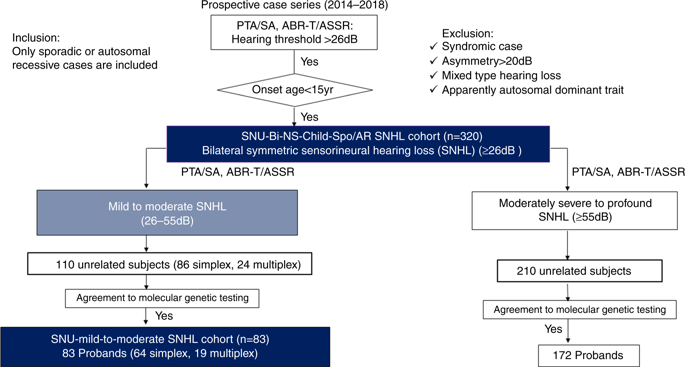Genetics in Medicine ( IF 8.8 ) Pub Date : 2020-03-17 , DOI: 10.1038/s41436-020-0774-9 Bong Jik Kim 1, 2 , Doo-Yi Oh 3 , Jin Hee Han 3 , Jayoung Oh 3 , Min Young Kim 3 , Hye-Rim Park 3 , Jungirl Seok 4, 5 , Sung-Dong Cho 3 , Sang-Yeon Lee 3 , Yoonjoong Kim 3 , Marge Carandang 6 , In Sun Kwon 7 , Seungmin Lee 8 , Jeong Hun Jang 9 , Yun-Hoon Choung 9 , Sejoon Lee 10 , Hakmin Lee 11 , Sang Mee Hwang 12, 13 , Byung Yoon Choi 3, 14

|
Purpose
Timely diagnosis and identification of etiology of pediatric mild-to-moderate sensorineural hearing loss (SNHL) are both medically and socioeconomically important. However, the exact etiologic spectrum remains uncertain. We aimed to establish a genetic etiological spectrum, including copy-number variations (CNVs) and efficient genetic testing pipeline, of this defect.
Methods
A cohort of prospectively recruited pediatric patients with mild-to-moderate nonsyndromic SNHL from 2014 through 2018 (n = 110) was established. Exome sequencing, multiplex ligation-dependent probe amplification (MLPA), and nested customized polymerase chain reaction (PCR) for exclusion of a pseudogene, STRCP, from a subset (n = 83) of the cohort, were performed. Semen analysis was also performed to determine infertility (n = 2).
Results
Genetic etiology was confirmed in nearly two-thirds (52/83 = 62.7%) of subjects, with STRC-related deafness (n = 29, 34.9%) being the most prevalent, followed by MPZL2-related deafness (n = 9, 10.8%). This strikingly high proportion of Mendelian genetic contribution was due particularly to the frequent detection of CNVs involving STRC in one-third (27/83) of our subjects. We also questioned the association of homozygous continuous gene deletion of STRC and CATSPER2 with deafness–infertility syndrome (MIM61102).
Conclusion
Approximately two-thirds of sporadic pediatric mild-to-moderate SNHL have a clear Mendelian genetic etiology, and one-third is associated with CNVs involving STRC. Based on this, we propose a new guideline for molecular diagnosis of these children.
中文翻译:

孟德尔遗传对儿童轻度至中度听力损失的显着贡献及其综合诊断方法。
目的
及时诊断和识别小儿轻度至中度感音神经性听力损失 (SNHL) 的病因在医学和社会经济上都很重要。然而,确切的病因谱仍不确定。我们旨在建立该缺陷的遗传病因谱,包括拷贝数变异 (CNV) 和有效的基因检测管道。
方法
建立了一个从 2014 年到 2018 年( n = 110)前瞻性招募的轻度至中度非综合征 SNHL 儿科患者队列。进行了外显子组测序、多重连接依赖性探针扩增 (MLPA) 和嵌套定制聚合酶链反应 (PCR),以从队列的子集 ( n = 83) 中排除假基因STRCP 。还进行了精液分析以确定不孕症(n = 2)。
结果
近三分之二 (52/83 = 62.7%) 的受试者证实了遗传病因,其中STRC相关性耳聋 ( n = 29, 34.9%) 最为普遍,其次是MPZL2相关性耳聋 ( n = 9, 10.8) %)。孟德尔遗传贡献的比例如此之高,尤其是由于在我们三分之一(27/83)的受试者中频繁检测到涉及STRC的 CNV。我们还质疑STRC和CATSPER2的纯合连续基因缺失与耳聋-不孕症综合征 (MIM61102) 的关联。
结论
大约三分之二的散发性小儿轻度至中度 SNHL 具有明确的孟德尔遗传病因,三分之一与涉及STRC的 CNV 相关。基于此,我们提出了对这些儿童进行分子诊断的新指南。



























 京公网安备 11010802027423号
京公网安备 11010802027423号